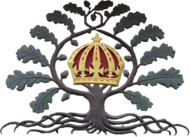Tory socialism
| Part of the Politics series on |
| Toryism |
|---|
 |
Tory socialism was a term used by historians, particularly of the early Fabian Society, to describe the governing philosophy of the British Prime Minister Benjamin Disraeli. The term is also used by many free-market advocates to describe certain strains of conservatism that are more reformist-minded and believe in a more activist government (e.g., paternalistic conservatism).
For instance, the domestic policies of Richard Nixon were also said by many libertarians to be "Tory socialist",[1][2] which they believed had much in common with the philosophy of "big government conservatism" espoused by many neo-conservatives. It was in keeping with this that David Gelernter wrote a long essay in The Weekly Standard extolling Disraeli as the founder of modern conservatism.[3] The phrase has also been used by Vernon Bogdanor to describe the thinking of Ferdinand Mount[4] and was used by Arnold Toynbee to describe the beliefs of Joseph Rayner Stephens and Richard Oastler.[5] The phrase was also used to describe both Stanley Baldwin and Harold Macmillan in the 1930s and by Tony Judge in his biographical study of Robert Blatchford[6] and in a wider study of Tory socialism between 1870 and 1940.[7]
See also[]
References[]
- ^ Rothbard, Murray. "Bill & Irving & Ken & Patrick". LewRockwell.com.
- ^ Rothbard, Murray. "Nixonian Socialism". Mises Institute.
- ^ Gelernter, David (7 February 2005). "The Inventor of Modern Conservatism". The Weekly Standard. Retrieved 21 April 2009.
- ^ Bogdanor, Vernon (28 September 2004). "Less equal than others". Telegraph.co.uk. Retrieved 21 April 2009.
- ^ Tyler, Colin (October 2012). "D. G. Ritchie on socialism, history and Locke". Journal of Political Ideologies. 17 (3): 262. doi:10.1080/13569317.2012.716615.
- ^ Judge, Tony (2013). Tory Socialist: Robert Blatchford and 'Merrie England.
- ^ Judge, Tony (2019), Tory Socialism in English Culture Politics and Society 1870–1940
- Conservative Party (UK) terms
- History of the Conservative Party (UK)
- Benjamin Disraeli
- Fabian Society
- Richard Nixon
- Toryism
- Types of socialism
- United Kingdom politics stubs